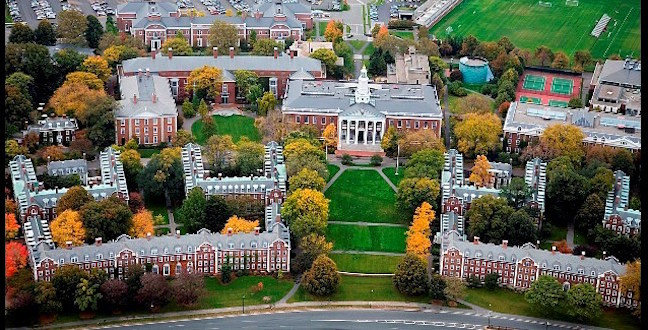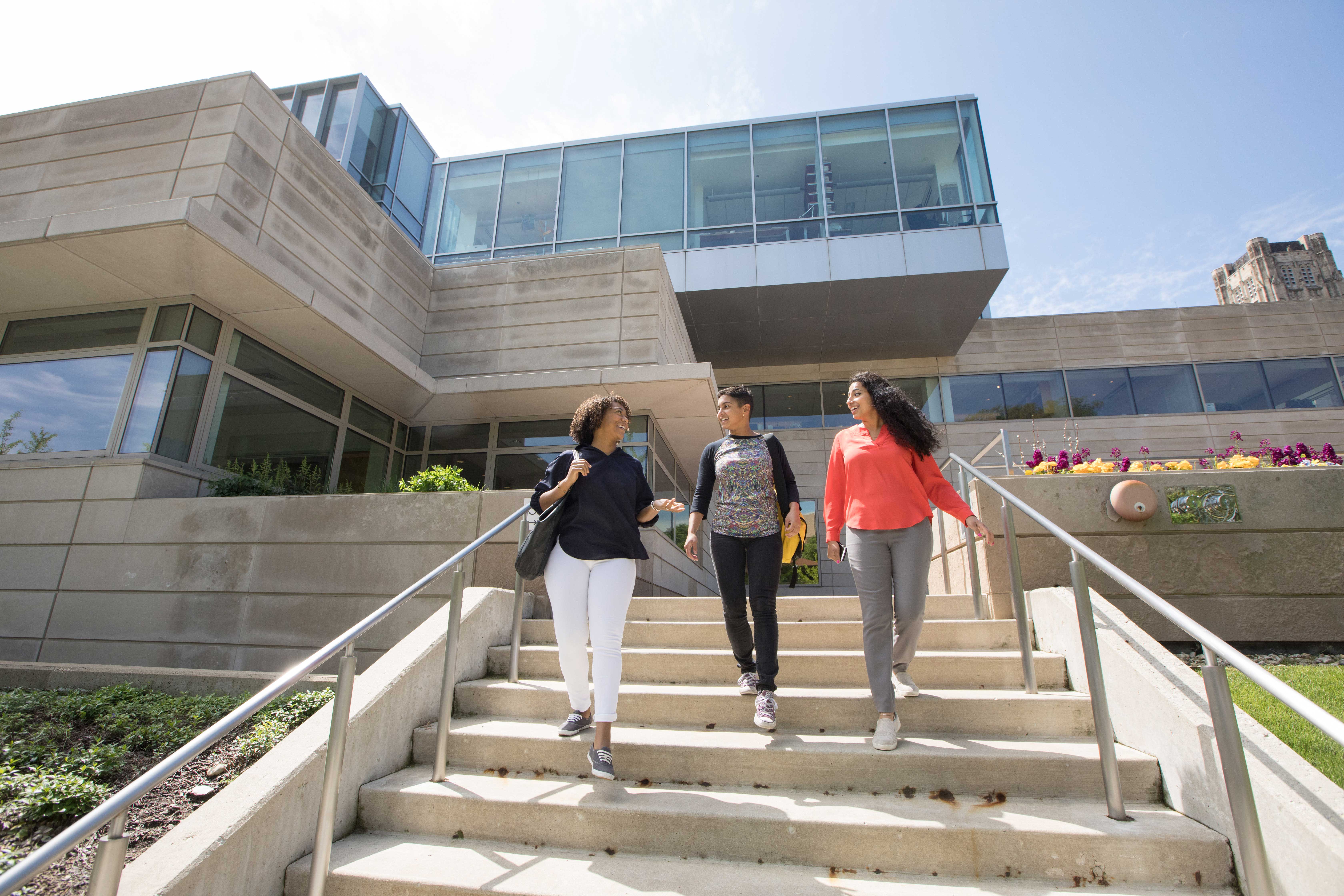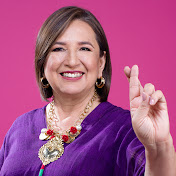
An aerial view of the Harvard Business School campus
Harvard Business School Partners With Black-Owned Businesses
A new b-school course is connecting MBAs with local Black-owned businesses.
Scaling Minority Businesses, a new field class at Harvard Business School, turns MBA students into strategic consultants, pairing them with Boston-area, Black-owned businesses according to an HBS press release. The goal, according to officials, is to make an impact in the fight for racial justice.
“I felt it was important that Harvard focus on how it could use its resources to engage with the Boston community in ways that would address the problems of racism and inequities,” Henry McGee, an HBS professor who serves as faculty co-advisor of the African American Student Union, says in the press release. “As a lot of businesses have made commitments to address these issues, it’s important that our educational institutions do as well.”
CATALYST FOR ACTIVISM
When news broke that George Floyd was killed by Minneapolis police back in May, HBS professors Jeff Bussgang and McGee got together to brainstorm how they could put forth an effort to support racial equity in the HBS curriculum.
Bussgang says, ultimately, the value behind HBS is in its network – something that he feels could be extended to benefit the local Black businesses in Boston.
“The HBS value proposition to our students is heavily focused on the network, and that network has yielded great results for all three of us as alumni and faculty, but it’s one that obviously not everyone has access to,” Bussgang says in the press release. “To be able to bring that network to bear for Black owned businesses is pretty awesome. We hope that these businesses will benefit from this relationship not only over the course of this semester but also beyond, and that we can create some connectivity with the Harvard community in general and the HBS community in particular, to advance their knowledge, social capital, and eventually their access to financial capital.”
SCALING MINORITY BUSINESSES
Bussgang and McGee partnered with Archie Jones, another HBS professor with expertise in scaling businesses, to bring the effort to life.
“I immediately loved the idea,” Jones says. “I had invested much of my career in scaling businesses, so the opportunity to point that experience and expertise at communities of color and businesses within those underrepresented communities was the perfect use of the skill set I developed at HBS and honed afterwards. I also loved that it involved field work with students—I know how powerful that experience can be. It felt like we as a team could really deliver on the promises of the course.”
10 local Black-owned businesses in Boston were brought on board to partner with MBA students. The businesses include some of the largest minority-owned companies in the state of Massachusetts, spanning industries such as real estate and construction.
John Cruz III is president and CEO of Cruz Companies, a third-generation family business in the fields of construction, development, and management. He says his family is excited for the opportunity to partner with HBS experts.
“We’re at a pinnacle point in our companies, ready to market our firm for a lot of new growth, and therefore it was a natural fit,” Cruz III says. “We want to concentrate on our real estate management side, which is headed up by my son, Justin. I’m excited to be in the course not only for what we might learn, but to have some of the best thinkers and teachers out there critique us and help us move forward. I can’t wait to get in the trenches with the students, and to also have the students learn more and contribute to Black business success stories.”
Sources: HBS, The New York Times

The University of Chicago’s Booth School of Business
How To Approach Booth’s New Video Statement
Chicago Booth MBA interview invitations are trickling out. This year, however, offers a new element to the interview: a 60-second video statement.
Bill Kooser, an MBA Admissions consultant and Director at Fortuna Admissions and former Booth Associate Dean, recently discussed the new Booth video component and how applicants should go about addressing it.
WHAT IS A VIDEO STATEMENT?
In recent years, many b-schools have begun to implement mandatory video statements as a way to learn more about their applicants.
At MIT Sloan, MBA applicants are required to upload a 60-second video as part of their application. Sloan asks applicants to introduce themselves to their future classmates, discuss their past experiences, and touch on why Sloan is the best fit for their goals.
Kooser says the video statement is a way for b-schools to get a more authentic portrait of an applicant.
“While programs have different time limits and questions, all are seeking an authentic and unscripted glimpse of your poise, character, motivations and ambitions,” he writes. “In addition to seeing you in action, your video presentation allows the MBA admissions committee to assess your confidence, presentation style, language skills, and ability to think on your feet.”
BOOTH VIDEO STATEMENT
Booth asks applicants to address the following in their video statement:
- Tell us about something new you learned recently that shifted your worldview. How did it influence your behavior and/or actions?
- What is something you wish people knew about you, but you’re not sure that they do?
Kooser says how you address these questions is more important than what you actually say.
“Booth is deploying this approach as a way to get to know you in a different way – to actually see you, get a sense of your communication style and ability, and to gauge personality,” he writes.
The first prompt, Kooser says, is an opportunity for applicants to discuss their values, passions, and how recent circumstances have pushed you to grow or drive change.
“There are many issues in the world today that could influence this response – BLM, the election in the US, China-US relations, climate issues, Covid – the list goes on,” Kooser writes. “This is a chance to highlight an issue important to you and show that you not only pay attention to what’s going on, but also have been motivated to take some action.”
The second prompt offers a more personal or playful approach.
“It is more about your personality and interests rather than your view of world events. I would use this question if there is something REALLY intriguing about you – not something that could be considered ‘run of the mill,’” Kooser writes. “I think the key here is focus even more on personality. If you go with this question, you’ll want the issue to be captivating and there is even more opportunity to deploy humor, unusual location, props, etc., to get the message across.”
Sources: Fortuna Admissions, MIT Sloan

Columbia Business School 2019 graduation
Discussing Fit In the Columbia Business School Essay
Fit is incredibly important when it comes to the MBA.
In fact, according to experts, fit is arguably more important than ranking and prestige of a b-school.
“If you seek a business school environment where you’ll truly thrive, focus on fit over ranking and brand,” Stacy Blackman, of Stacy Blackman Consulting, says. “While the latter two are important, if you don’t feel at home from the moment you set foot on campus, you won’t get the most out of the MBA experience.”
And fit is exactly what admissions officers at Columbia Business are looking for when it comes to the b-school’s essay prompts. The admissions experts at Accepted recently broke down Columbia Business School’s essay prompts and how applicants should go about discussing fit.
ESSAY 1
The first essay in Columbia’s MBA application asks applicants the following:
Through your resume and recommendations, we have a clear sense of your professional path to date. What are your career goals over the next 3-5 years and what, in your imagination, would be your long-term dream job?
The important distinction in this prompt, according to Accepted, is the focus on the long-term.
Essentially, Columbia admission officers want to know how you see your career developing after your immediate post-MBA job.
When answering this question, Accepted recommends that applicants avoid repeating their resume. But rather, focusing on the future.
“Instead, tell them what you want to do 3-5 years into the future, which should build on your first post-MBA job,” according to Accepted. “Make sure to answer the long-term question and feel free to dream and aspire, but at the same time reveal an ambitious, but feasible professional goal.”
Essay 2
The second essay asks applicants the following:
Why do you feel Columbia Business School is a good fit for you?
This is the opportunity to demonstrate your knowledge of Columbia’s MBA program and how you’d be a good fit for it.
“Be sure to reveal how you intend to use the program to prepare yourself to achieve the short-term goal that you provide in the short-answer question and the longer-term goals you discuss in Essay #1,” according to Accepted.
Additionally, it can be helpful to discuss the location of Columbia being in New York City. Accepted recommends applicants to keep in mind Columbia’s pride of being “at the very center of business.”
Sources: Accepted, Stacy Blackman Consulting
The post Harvard Business School Partners With Black-Owned Businesses appeared first on Poets&Quants.
This content was originally published here.
EL 2 DE JUNIO DEL 2024 VOTA PARA MANTENER
TU LIBERTAD, LA DEMOCRACIA Y EL RESPETO A LA CONSTITUCIÓN.
VOTA POR XÓCHITL













Comentarios